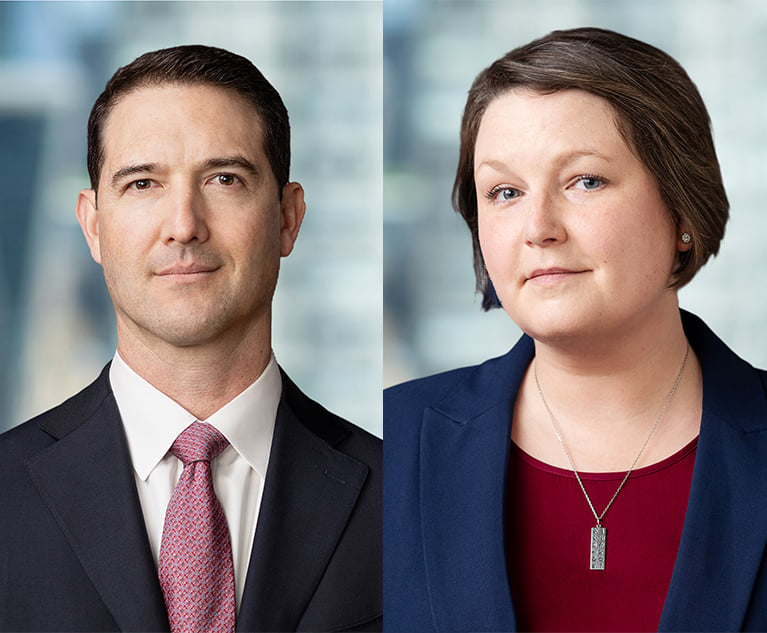Hand Delivery Service of Process Challenges in a Socially Distant World
Noble as it may be, New York's policy preference of hand delivery service now squarely conflicts with the public policy goals of social distancing to slow the spread of a highly infectious virus.
May 14, 2020 at 10:45 AM
6 minute read
 As the nation grapples with the COVID-19 pandemic, in-person life has been paused and the concept of "social distancing" has become part of our everyday vocabulary. Eventually stay-at-home orders will be lifted and people will re-enter life outside the home, but social distancing recommendations are expected to remain for the foreseeable future. Social distancing will raise a number of legal issues, including effectuating hand delivery service of process on natural persons. This article will review New York's service of process requirements and explore whether changes need to be made to strike a different balance of interests in our new social distanced world.
As the nation grapples with the COVID-19 pandemic, in-person life has been paused and the concept of "social distancing" has become part of our everyday vocabulary. Eventually stay-at-home orders will be lifted and people will re-enter life outside the home, but social distancing recommendations are expected to remain for the foreseeable future. Social distancing will raise a number of legal issues, including effectuating hand delivery service of process on natural persons. This article will review New York's service of process requirements and explore whether changes need to be made to strike a different balance of interests in our new social distanced world.
It is a bedrock principle of our legal system that parties to a litigation must be made aware of legal proceedings brought against them. Recognizing, however, that it can be difficult to personally serve natural persons, it is well settled that service of process can be obtained by methods other than by personal hand delivery and still pass constitutional muster. In Milliken v. Meyer, the Supreme Court held that that the "adequacy so far as due process is concerned is dependent on whether or not the form of substituted service provided for such cases and employed is reasonably calculated to give him actual notice of the proceedings and an opportunity to be heard." 311 U.S. 457, 463 (1940). New York, like all states, allows for such non-hand delivery substitute service, but historical concerns with "sewer service" resulted in New York having among the highest "due diligence" thresholds before non-hand delivery substitute service is permitted.
New York's Civil Procedure Law and Rules §308 governs personal service of process upon a natural person and provides five methods: (1) directly handing the summons to the person anywhere within the state; (2) hand delivering the summons to a person of suitable age and discretion at the actual place of business, dwelling place, or usual place of abode of the person to be served, followed by a mailing; (3) hand delivering the summons to a designated agent; (4) if the above are not possible, by affixing the summons to the door of either the actual place of business, dwelling place, or usual place of abode and then mailing a copy by first class mail (known as "nail and mail"), or (5) as the court may otherwise direct (e.g., publication, certified or registered mail). Process servers, however, have long faced challenges of physically hand delivering documents to people who do not know them and likely do not want what they are delivering, leaving a plaintiff to turn to §§308(4) and (5). By design, service pursuant to §308(4) is onerous, involving a three-step process, including requiring a plaintiff to first attempt personal service pursuant to §308(1) and hand delivery substitute service pursuant to §308(2). In making these attempts, process servers are required to demonstrate due diligence in attempting to effectuate in-person service, which typically involves making multiple attempts at a defendant's place of business or dwelling place at various times of day. In assessing a plaintiff's due diligence, the court will assess the "plaintiff's need, the public interest, the reasonableness of the plaintiff's efforts under all the circumstances to inform the defendant, and the availability of other safeguards for the defendant's interests." Dobkin v. Chapman, 21 N.Y.2d 490, 503 (1968). Finally, after a litigant has unsuccessfully attempted to effectuate service pursuant to §§308(1), (2), and (4), then and only then, is a litigant permitted to attempt service pursuant to §308(5). This method also requires a litigant to seek an order from the court to authorize service in a manner calculated to give notice to defendant where no other method of service was possible.
Moreover, to further guard against "sewer service," the New York City Department of Consumer and Worker Protection licenses and regulates non-attorney process servers. Only licensed non-attorney process servers are permitted to effectuate service of process on natural persons in New York City. See NYC Administrative Code, Title 20. Consumer Affairs, Chapter 2. Licenses, Subchapter 23, §20-403. Licensed process servers are required to maintain electronic records that are free from tampering and use electronic devices that record global positioning system location while serving process. Failure to abide by these regulations can result in fines for the process server and, more importantly, a traverse hearing where the process server's credibility will be squarely at issue and could result in dismissal of the action. See Matter of Pasanella v. Quinn, 126 A.D.3d 504 (1st Dept. 2015). Indeed, there is an abundance of New York court decisions over the years reversing default judgments and otherwise dismissing actions for lack of service of process.
Noble as it may be, New York's policy preference of hand delivery service now squarely conflicts with the public policy goals of social distancing to slow the spread of a highly infectious virus. Assuming that New York is unwilling to implement a radical switch to electronic service (e.g., email and/or text), a more tempered solution may be found in neighboring New Jersey. As compared to New York, New Jersey makes substitute service by mail simpler. In New Jersey, if personal service cannot be effected "after a reasonable and good faith attempt," plaintiff is authorized, without obtaining any further court intervention, to effectuate substitute service via mailing. See R. 4:4-3. New Jersey does not require specific searches to be made in making the attempt to effectuate personal service, but only that a "diligent inquiry" is made prior to attempting service by mail. See U.S. Bank Nat. Ass'n v. Curcio, 444 N.J. Super. 94 (App. Div. 2016). After the diligent inquiry, a plaintiff is permitted to mail a copy of the summons and complaint by registered or certified mail, return receipt requested, as well as by ordinary mail, "to the usual place of abode of the defendant or a person authorized by rule of law to accept service for the defendant or, with postal instructions to deliver to addressee only, to defendant's place of business or employment." See R. 4:4-3 and R. 4:4-4(b)(1)(C). If the defendant refuses to claim or accept delivery of the registered or certified mail, but the ordinary mailing is not returned, the simultaneous mailing constitutes effective service. See R. 4:4-3.
Social distancing will be with us for a long while, and will soon be joined by a host of other public health measures that will make hand delivery service even more difficult and dangerous. As such, New York should consider how to best strike the balance between ensuring that litigants receive Constitutionally required notice and forcing process servers to make trip after trip at different times of day to the homes of strangers in the hopes of handing them papers they often do not expect and rarely want. Expanding non-hand delivery substitute service options like registered or certified mail would seem to strike the better public policy balance.
Brian S. McGrath is a partner and Ashley R. Newman is an associate at Hinshaw & Culbertson.
This content has been archived. It is available through our partners, LexisNexis® and Bloomberg Law.
To view this content, please continue to their sites.
Not a Lexis Subscriber?
Subscribe Now
Not a Bloomberg Law Subscriber?
Subscribe Now
NOT FOR REPRINT
© 2025 ALM Global, LLC, All Rights Reserved. Request academic re-use from www.copyright.com. All other uses, submit a request to [email protected]. For more information visit Asset & Logo Licensing.
You Might Like
View All


Piercing the Corporate Veil; City’s Authority To Order Restorations; Standing: This Week in Scott Mollen’s Realty Law Digest
Law Firms Mentioned
Trending Stories
Who Got The Work
J. Brugh Lower of Gibbons has entered an appearance for industrial equipment supplier Devco Corporation in a pending trademark infringement lawsuit. The suit, accusing the defendant of selling knock-off Graco products, was filed Dec. 18 in New Jersey District Court by Rivkin Radler on behalf of Graco Inc. and Graco Minnesota. The case, assigned to U.S. District Judge Zahid N. Quraishi, is 3:24-cv-11294, Graco Inc. et al v. Devco Corporation.
Who Got The Work
Rebecca Maller-Stein and Kent A. Yalowitz of Arnold & Porter Kaye Scholer have entered their appearances for Hanaco Venture Capital and its executives, Lior Prosor and David Frankel, in a pending securities lawsuit. The action, filed on Dec. 24 in New York Southern District Court by Zell, Aron & Co. on behalf of Goldeneye Advisors, accuses the defendants of negligently and fraudulently managing the plaintiff's $1 million investment. The case, assigned to U.S. District Judge Vernon S. Broderick, is 1:24-cv-09918, Goldeneye Advisors, LLC v. Hanaco Venture Capital, Ltd. et al.
Who Got The Work
Attorneys from A&O Shearman has stepped in as defense counsel for Toronto-Dominion Bank and other defendants in a pending securities class action. The suit, filed Dec. 11 in New York Southern District Court by Bleichmar Fonti & Auld, accuses the defendants of concealing the bank's 'pervasive' deficiencies in regards to its compliance with the Bank Secrecy Act and the quality of its anti-money laundering controls. The case, assigned to U.S. District Judge Arun Subramanian, is 1:24-cv-09445, Gonzalez v. The Toronto-Dominion Bank et al.
Who Got The Work
Crown Castle International, a Pennsylvania company providing shared communications infrastructure, has turned to Luke D. Wolf of Gordon Rees Scully Mansukhani to fend off a pending breach-of-contract lawsuit. The court action, filed Nov. 25 in Michigan Eastern District Court by Hooper Hathaway PC on behalf of The Town Residences LLC, accuses Crown Castle of failing to transfer approximately $30,000 in utility payments from T-Mobile in breach of a roof-top lease and assignment agreement. The case, assigned to U.S. District Judge Susan K. Declercq, is 2:24-cv-13131, The Town Residences LLC v. T-Mobile US, Inc. et al.
Who Got The Work
Wilfred P. Coronato and Daniel M. Schwartz of McCarter & English have stepped in as defense counsel to Electrolux Home Products Inc. in a pending product liability lawsuit. The court action, filed Nov. 26 in New York Eastern District Court by Poulos Lopiccolo PC and Nagel Rice LLP on behalf of David Stern, alleges that the defendant's refrigerators’ drawers and shelving repeatedly break and fall apart within months after purchase. The case, assigned to U.S. District Judge Joan M. Azrack, is 2:24-cv-08204, Stern v. Electrolux Home Products, Inc.
Featured Firms
Law Offices of Gary Martin Hays & Associates, P.C.
(470) 294-1674
Law Offices of Mark E. Salomone
(857) 444-6468
Smith & Hassler
(713) 739-1250







